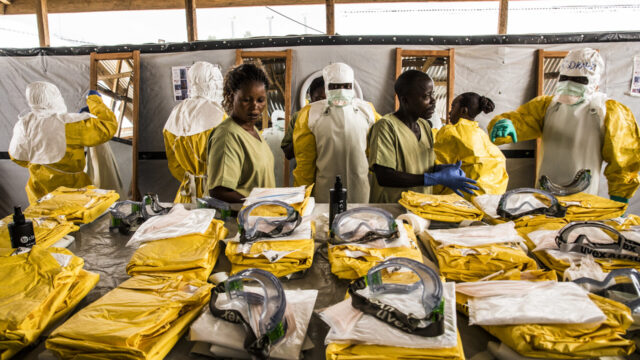Simulation
Suez Canal Crisis: National Sovereignty versus International Access to Waterways
On July 26, 1956, Egyptian president Gamal Abdel Nassar nationalized the Suez Canal, intending to take control of the canal’s operation and its revenue.

The countries of Farfelu and Anyep are in the middle of an Ebola outbreak that has the potential to spread into more countries and across the globe. While the two countries share similar cultures, they are currently experiencing tense relations partly as a result of the growing outbreak. Farfelu has a large tribal population that widely relies on traditional medicine. These practices have been questioned by the neighboring country Anyep. Although Anyep has a more modern healthcare system, it is still seeing alarmingly high infection rates. The governments of these countries formed National Ebola Response Centers to coordinate a streamlined approach to the outbreak. However, recognizing that the outbreak will not slow without an internationally coordinated response, Anyep called for a meeting with Farfelu, the United States, the World Health Organization, and Doctors Without Borders.
In this hypothetical scenario, students will have to collaborate to overcome cultural differences in order to stop the spread of Ebola in the region and prevent a global pandemic. The exercise will develop skills in composure, awareness, analysis, communication, management, creativity, leadership, and collaboration.
Infectious diseases and viruses are not only a threat to a country’s well being, but also to the international community. In order to stop the spread of this disease, countries must work together swiftly to prevent a global pandemic that could cost many lives. It is estimated that between 151,700 and 575,400 people died of the H1N1 virus within the first year of the outbreak. While some countries are more able to handle an infectious outbreak, others are less so. In regions that have limited or no laboratory testing available, infection rates are underrepresented, thus leading to less global attention in areas that are especially in need. How can international leaders work together to stop preventable deaths?
The United States works closely with the international community to monitor and prevent the spread of dangerous diseases. The U.S. Department of State uses its expertise to advise other governments, offer resources and support, and implement infectious disease policies overseas in the furtherance of global and national health security.